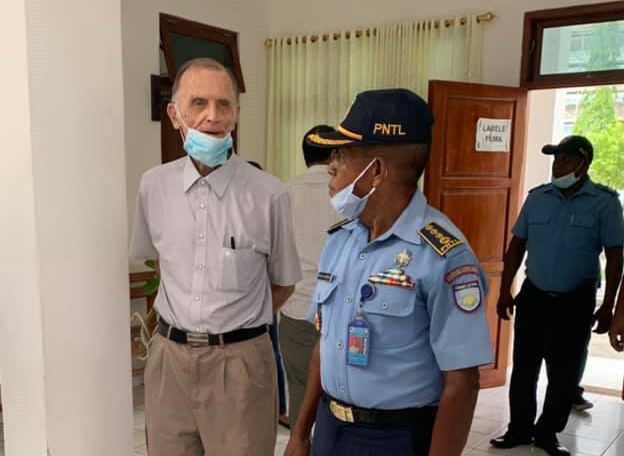Imagine this: a foreign missionary builds a shelter home in one of the poorest corners of Timor-Leste, the remote Oecusse enclave. A long-term resident, uniquely conversant in the local language, Uab Meto, he promises poor families who entrust their children to them that they will be provided education and food. He adds to his Catholic ministry the mastery of local animist rites. In his home community, Kutet, he is both loved and feared.
Over the decades his legend grows throughout the island and the world. He has a write-up in the Lonely Planet guidebook. To visitors, the shelter home appears to be a dignified oasis in the poor and hungry hills. The children there seem happy, busy with school, games and chores that, unusually, are shared out equally between girls and boys. Locals walk for days to request his prayers and advice. Foreigners go away believing they have witnessed something special, many of them willing to sacrifice their own savings to support a living saint.
It is known to the local and donor community that young girls would regularly take turns to sleep in his bedroom, but the priest is quick to brush off any suggestion of impropriety. In Timor-Leste, he explains, it is normal for children to sleep in the same room as their parents.
But unbeknownst to the many who trusted and loved him, the missionary was not a saint. His shelter home was not an oasis. The co-sleeping was not innocent. He was, rather, a calculating predator. His kindly persona, a deliberate façade.
Sadly, this is a true story. On 9 June, after being delayed four times, the trial of this man recommenced. His name is Richard Daschbach, and his saintliness was, we now know, an illusion. Born in the United States, Daschbach was ordained into the Society of the Divine Word order in the early 1960s and sent to West Timor, eventually taking on Indonesian citizenship. In the early 1990s he founded a shelter home in the Oecusse enclave, Topu Honis. His actions during the conflict of 1999 were the stuff of legend. It appears now that his status gave him a frightening degree of power over the community in which he lived.
In early 2018, foreign supporters of Daschbach heard rumours that he had been behaving inappropriately towards the children in his care. They expected him to deny it, but instead he calmly admitted that he was a paedophile, and always had been.
The law moved slowly. Daschbach was only arrested in April 2019 and formally indicted in September 2020. His trial began in February 2021 but was quickly postponed, first until March, then until 24 May, then until 7 June and finally to 9 June.
Timor-Leste is rightly proud of its status as a thriving democracy, but as Freedom House put it in 2020, ‘judicial independence and due process are undermined by serious capacity deficits and political influence’. The shambolic prosecution of Daschbach until now is an example of this.
Timor-Leste has long struggled with gender-based violence, and although less high-profile cases of sexual abuse regularly go before the courts, Daschbach is the first cleric to be put on trial for this sort of crime. According to Timor-Leste’s constitution, access to justice is a fundamental right, and the country has ratified both the United Nations Convention on the Rights of the Child and Convention on the Elimination of All forms of Discrimination Against Women. The upcoming trial will make clear to what degree these commitments are reflected in reality.
While Daschbach’s 2020 indictment on multiple counts of sexual abuse of children, child pornography and domestic violence was a great step forward, it took close to three years for this case to be brought to trial, during which time the prosecutor in charge had to be replaced no less than twice. Whether or not it would have gone to trial at all without constant pressure from the survivors’ legal representatives is an open question.
The lack of a functional oversight body for private lawyers in Timor-Leste means that Daschbach’s counsels can blatantly violate basic professional ethics without facing any consequences, and it shows. The trial was first delayed due to his lawyers not being prepared, a second time after their request for another delay was accepted by the court, and a third and fourth time due the man they are defending simply being a no-show.
The judicial system has also shown far too much tolerance towards Daschbach’s conduct after his detention, including his absconding from house arrest and being filmed interacting with children from the Topu Honis. The court’s seeming willingness to accept such behaviour is not worthy of the bravery of the 15 young survivors willing to bear witness against him.
The stakes in this case, when it does reconvene on 9 June, are high. If an effective prosecution is secured it will send a message that in Timor-Leste powerful men can no longer get away with raping women and girls. Done wrong it may seriously jeopardise the hard-fought efforts that women and men before us have undertaken to build a strong protection system for victims of gender-based violence and establish an independent and impartial judiciary.
We understand that Timor-Leste’s young legal system exists in a complex and often fraught environment, which is only exacerbated by the many exceptional political, ecological and social challenges the country is facing. That Daschbach has been brought to trial is a great step – that his case has been politicised, and the subject of a range of bizarre conspiracy theories is not.
We believe in Timor-Leste, and the Timorese people, and know we are all capable of doing better for the daughters of this land. We hope that the same is the case for our leaders and our institutions. The Daschbach case is a stark demonstration of why it matters.




